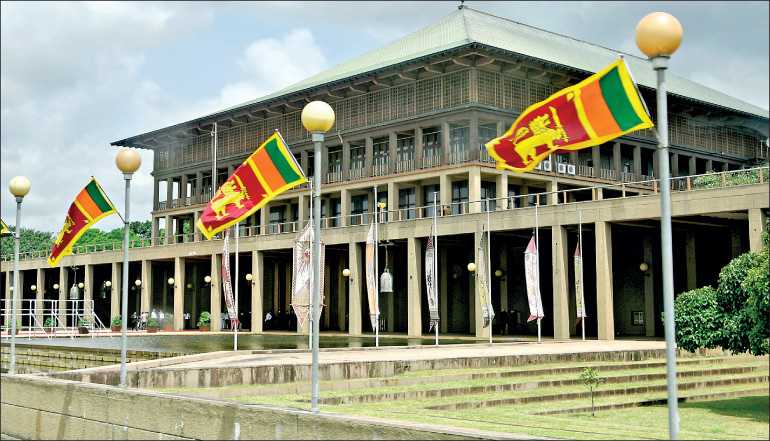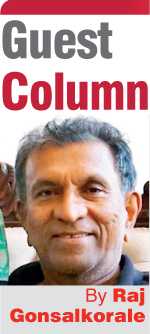Tuesday Feb 24, 2026
Tuesday Feb 24, 2026
Thursday, 3 September 2020 00:15 - - {{hitsCtrl.values.hits}}

One should make sure the vehicle of action and progress moving fast also has good brakes, as a weakness in this area could undo all the good that could be achieved through fast action. Constitutional checks and balances are these breaks, and these need to be strengthened not weakened by a Parliament with a two-thirds majority – Pic by Shehan Gunasekara
The 19th Amendment may have been introduced for many reasons. One reason may have been to curtail the powers of the Executive President and to strengthen the powers of the Legislature instead. 
What led to this is the subject of discussion and debate from the time the 19th Amendment became law in 2015. A generally held view is that the real motive was to curtail the powers of the Presidency that Mahinda Rajapaksa enjoyed as President, and to strengthen the powers of the Prime Minister Ranil Wickremesinghe.
President Mahinda Rajapaksa did not create these powers, and he inherited them from a UNP President, J.R. Jayewardene. However, this inheritance was enhanced with the 18th Amendment. Another generally held view is that the 18th Amendment vested even more powers in one person, without adequate checks and balances.
In this context, introduction of the 19th Amendment that reversed the powers vested through the 18th Amendment was a strengthening of democracy. The problem with the 19th Amendment was not its relevance and a democratic need, both of which were valid, but the not so well thought of and drafted document which accentuated confusion rather than easing them.
The approach taken by the drafters of the 19th Amendment tended to give an impression that they were based on personalities rather than on policies. The confusion and ambiguities came to a head with the end of the honeymoon between President Sirisena and Prime Minister Wickremesinghe.
It would not be a misplaced view to state that the reason for this duo’s marriage was based on one single shared objective. To defeat President Mahinda Rajapaksa in 2015. Once this was achieved, all the underlying issues, all relating to the exercise of power, surfaced.
The 19th Amendment has many positives, and amongst them the re-introduction of independent commissions first introduced by President Chandrika Kumaratunga in 2000 via the 17th Amendment to the Constitution. These had been watered down by the 18th Amendment.
If anyone is to find fault with the functioning of the independent commissions, it had much less to do with the concept of these commissions than with the persons appointed to them. Those who are now promoting changes to these commissions or even the outright disbanding of them should keep in mind the old adage not to throw the baby out with the bathwater.
Strengthening the independent commissions and improving their functioning should become the discussion point, not disbanding them or diluting their powers and responsibilities. Those who argue that the Executive President should have ultimate power, even over these Commissions, should keep in mind that a President will go before the people to whom he or she is answerable, only once in five years.
It is more than possible that a President could damage the democracy of the country during that period and not be answerable to the people in between. This is where entities such as the independent commissions could play the role of an honest broker on behalf of the people and keep a check on undemocratic practices of not just an Executive President but even a Legislature drunken with power.
An opinion has been expressed that in Article 4 where the sovereignty of the people has been dealt with, specified as follows in Sub Article 4b: “The executive power of the People, including the defence of Sri Lanka, shall be exercised by the President of the Republic elected by the People.
While this may be a good point of law, the exercise of the sovereignty of the people in a practical and realistic sense should be carefully considered as the interpretation of this opinion probably has caused most of the confusion in recent years.
One could say all will be good if this executive power is in the hands of the right person, but could be seriously detrimental to democracy and the country if it is not. This is where checks and balances come in the exercise of this executive power.
This leads to questions like how one measures the yardsticks, if any, relating to people’s sovereignty. In 1977, under the old electoral system of first past the post, J.R. Jayewardene and the UNP had a 5/6th majority in Parliament with just over 51% of the vote in their favour. More than 80% of people cast their votes.
In 1988, R. Premadasa under the Proportional Representation system managed 50.43 % of the votes cast where only 55.31% of the registered voters cast their votes. In Presidential Elections, so far, President Chandrika Kumaratunga received the highest number of votes cast with 62.28%. However, the total votes cast was 70.94%
President Gotabaya Rajapaksa received 52.25% votes in an election where the total vote cast was 83.72%. In all these instances, how does one interpret which leader is most qualified to exercise the executive power of the people, or should all of them do so in equal measure?
The answer possibly lies not in debating how sovereignty of the people is interpreted as there could be many academic arguments for and against each proposition. The practical, realistic argument should lie in what checks and balances are in place to take care of the segmentation of the country’s polity, comprising of those who did not vote for a particular individual, the minority community interests, the rights of women, children, the older generation, etc.
One could argue that these issues are in the domain of the Legislature, and once relevant laws are enacted to correct any inequities, the President will only exercise executive power while operating within the enacted laws and regulations.
However, how would one interpret a situation where a President acts within constitutional provisions derived from broad based provisions like Article 4 where the sovereignty of the people has been dealt with, as specified in Sub Article 4b (The executive power of the People, including the defence of Sri Lanka, shall be exercised by the President of the Republic elected by the People), but his or her action is not supported by specific legislation passed by Parliament?
It is understandable and recognised that Sri Lanka needs action and not words at this juncture, particularly in the post COVID-19 world of economic ruin.
However, one should make sure the vehicle of action and progress moving fast also has good brakes, as a weakness in this area could undo all the good that could be achieved through fast action. Constitutional checks and balances are these breaks, and these need to be strengthened not weakened by a Parliament with a two-thirds majority.
In defence of those who take the view that the partiality of some members of the independent commissions who made the commissions themselves partial, it is well to remember that one needs two hands to clap, and unless members of the commissions are absolutely impartial, they would compromise the independence of these commissions and discredit the very purpose for which they are enshrined in the Constitution.
Finally, there is the important issue of trust. Do people trust the politicians of today? They may trust a particular individual and have much hope with that person’s ability to lead the country in the post COVID world. However, the paramount law of impermanence could change things and if Constitutions are changed because of an individual’s popularity, it could have a reverse effect if things change and power ends up in the wrong hands.
Democracy must advance as that has a greater staying power than individuals or political parties.